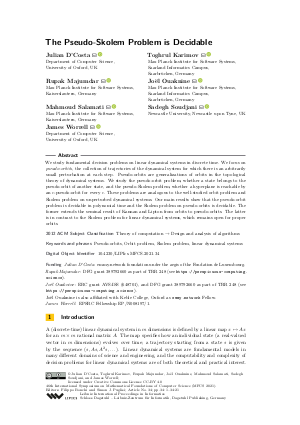The Pseudo-Skolem Problem is Decidable
Authors
Julian D'Costa  ,
Toghrul Karimov
,
Toghrul Karimov  ,
Rupak Majumdar
,
Rupak Majumdar  ,
Joël Ouaknine
,
Joël Ouaknine  ,
Mahmoud Salamati
,
Mahmoud Salamati  ,
Sadegh Soudjani
,
Sadegh Soudjani  ,
James Worrell
,
James Worrell 
-
Part of:
Volume:
46th International Symposium on Mathematical Foundations of Computer Science (MFCS 2021)
Part of: Series: Leibniz International Proceedings in Informatics (LIPIcs)
Part of: Conference: Mathematical Foundations of Computer Science (MFCS) - License:
 Creative Commons Attribution 4.0 International license
Creative Commons Attribution 4.0 International license
- Publication Date: 2021-08-18
File

PDF
LIPIcs.MFCS.2021.34.pdf
- Filesize: 0.8 MB
- 21 pages
Document Identifiers
Subject Classification
ACM Subject Classification
- Theory of computation → Design and analysis of algorithms
Keywords
- Pseudo-orbits
- Orbit problem
- Skolem problem
- linear dynamical systems
Metrics
- Access Statistics
-
Total Accesses (updated on a weekly basis)
0Document
0Metadata
Abstract
We study fundamental decision problems on linear dynamical systems in discrete time. We focus on pseudo-orbits, the collection of trajectories of the dynamical system for which there is an arbitrarily small perturbation at each step. Pseudo-orbits are generalizations of orbits in the topological theory of dynamical systems. We study the pseudo-orbit problem, whether a state belongs to the pseudo-orbit of another state, and the pseudo-Skolem problem, whether a hyperplane is reachable by an ε-pseudo-orbit for every ε. These problems are analogous to the well-studied orbit problem and Skolem problem on unperturbed dynamical systems. Our main results show that the pseudo-orbit problem is decidable in polynomial time and the Skolem problem on pseudo-orbits is decidable. The former extends the seminal result of Kannan and Lipton from orbits to pseudo-orbits. The latter is in contrast to the Skolem problem for linear dynamical systems, which remains open for proper orbits.
Cite As Get BibTex
Julian D'Costa, Toghrul Karimov, Rupak Majumdar, Joël Ouaknine, Mahmoud Salamati, Sadegh Soudjani, and James Worrell. The Pseudo-Skolem Problem is Decidable. In 46th International Symposium on Mathematical Foundations of Computer Science (MFCS 2021). Leibniz International Proceedings in Informatics (LIPIcs), Volume 202, pp. 34:1-34:21, Schloss Dagstuhl – Leibniz-Zentrum für Informatik (2021)
https://doi.org/10.4230/LIPIcs.MFCS.2021.34
BibTex
@InProceedings{dcosta_et_al:LIPIcs.MFCS.2021.34,
author = {D'Costa, Julian and Karimov, Toghrul and Majumdar, Rupak and Ouaknine, Jo\"{e}l and Salamati, Mahmoud and Soudjani, Sadegh and Worrell, James},
title = {{The Pseudo-Skolem Problem is Decidable}},
booktitle = {46th International Symposium on Mathematical Foundations of Computer Science (MFCS 2021)},
pages = {34:1--34:21},
series = {Leibniz International Proceedings in Informatics (LIPIcs)},
ISBN = {978-3-95977-201-3},
ISSN = {1868-8969},
year = {2021},
volume = {202},
editor = {Bonchi, Filippo and Puglisi, Simon J.},
publisher = {Schloss Dagstuhl -- Leibniz-Zentrum f{\"u}r Informatik},
address = {Dagstuhl, Germany},
URL = {https://drops.dagstuhl.de/entities/document/10.4230/LIPIcs.MFCS.2021.34},
URN = {urn:nbn:de:0030-drops-144742},
doi = {10.4230/LIPIcs.MFCS.2021.34},
annote = {Keywords: Pseudo-orbits, Orbit problem, Skolem problem, linear dynamical systems}
}
Author Details
- Max Planck Institute for Software Systems, Saarland Informatics Campus, Saarbrücken, Germany
- Max Planck Institute for Software Systems, Saarland Informatics Campus, Saarbrücken, Germany
Funding
- D'Costa, Julian: emmy.network foundation under the aegis of the Fondation de Luxembourg.
- Majumdar, Rupak: DFG grant 389792660 as part of TRR 248 (see https://perspicuous-computing.science).
- Ouaknine, Joël: ERC grant AVS-ISS (648701), and DFG grant 389792660 as part of TRR 248 (see https://perspicuous-computing.science). Joël Ouaknine is also affiliated with Keble College, Oxford as http://emmy.network/ Fellow.
- Worrell, James: EPSRC Fellowship EP/N008197/1.
References
-
Dmitri V. Anosov. Geodesic flows on closed Riemannian manifolds of negative curvature. Proc. Steklov Inst. Math., 90, 1967.

-
Saugata Basu, Richard Pollack, and Marie-Françoise Roy. Algorithms in Real Algebraic Geometry. Springer, 2006.

-
Rufus Bowen. Equilibrium States and the Ergodic Theory of Anosov Diffeomorphisms, volume 470 of Lecture Notes in Mathematics. Springer-Verlag, 1975.

-
Jin-Yi Cai. Computing Jordan normal forms exactly for commuting matrices in polynomial time. Int. J. Found. Comput. Sci., 5(3/4):293-302, 1994.

-
Jin-Yi Cai, Richard J. Lipton, and Yechezkel Zalcstein. The complexity of the A B C problem. SIAM J. Comput., 29(6), 2000.

-
Henri Cohen. A Course in Computational Algebraic Number Theory. Springer, 1993.

-
George E. Collins. Quantifier elimination for real closed fields by cylindrical algebraic decompostion. In H. Brakhage, editor, Automata Theory and Formal Languages, pages 134-183, Berlin, Heidelberg, 1975. Springer Berlin Heidelberg.

-
Charles C. Conley. Isolated invariant sets and the Morse index, volume 25 of CBMS Regional Conference Series in Mathematics. American Mathematical Society, 1978.

-
Guoqiang Ge. Algorithms Related to Multiplicative Representations of Algebraic Numbers. PhD thesis, U.C. Berkeley, 1993.

-
Godfrey H. Hardy and Edward M. Wright. An Introduction to the Theory of Numbers. Oxford University Press, 1999.

-
Michael A. Harrison. Lectures on linear sequential machines. Technical report, DTIC Document, 1969.

-
Ravindran Kannan and Richard J. Lipton. Polynomial-time algorithm for the orbit problem. J. ACM, 33(4):808-821, 1986.

-
David W. Masser. Linear relations on algebraic groups. In New Advances in Transcendence Theory. Camb. Univ. Press, 1988.

-
Maurice Mignotte, Tarlok N. Shorey, and Robert Tijdeman. The distance between terms of an algebraic recurrence sequence. J. für die reine und angewandte Math., 349, 1984.

-
Joël Ouaknine and James Worrell. Positivity problems for low-order linear recurrence sequences. In Proceedings of the Twenty-Fifth Annual ACM-SIAM Symposium on Discrete Algorithms, SODA 2014, Portland, Oregon, USA, January 5-7, 2014, pages 366-379, 2014.

-
Joël Ouaknine and James Worrell. On linear recurrence sequences and loop termination. ACM SIGLOG News, 2(2):4-13, 2015.

-
Christos H. Papadimitriou and Georgios Piliouras. From nash equilibria to chain recurrent sets: An algorithmic solution concept for game theory. Entropy, 20(10):782, 2018.

-
James Renegar. On the computational complexity and geometry of the first-order theory of the reals. J. Symb. Comp., 1992.

-
Eduardo D. Sontag. Mathematical Control Theory: Deterministic Finite Dimensional Systems. Springer-Verlag, Berlin, Heidelberg, 1998.

-
Terence Tao. Structure and randomness: pages from year one of a mathematical blog. American Mathematical Society, 2008.

-
Nikolai K. Vereshchagin. The problem of appearance of a zero in a linear recurrence sequence (in russian). Mat. Zametki, 38(2), 1985.

